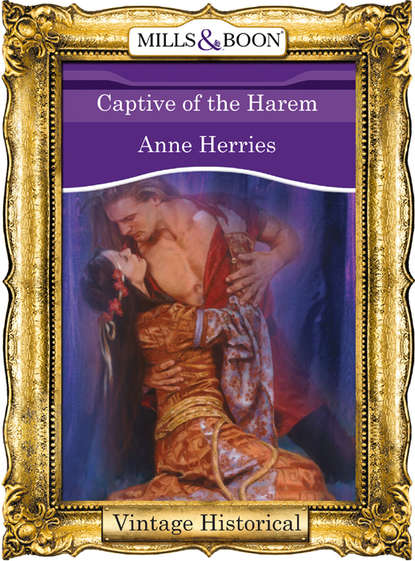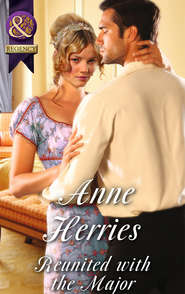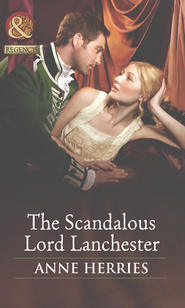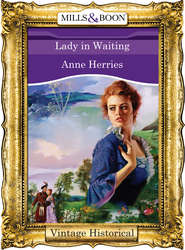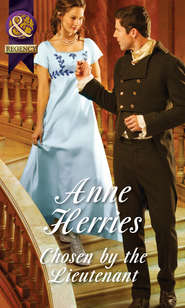По всем вопросам обращайтесь на: info@litportal.ru
(©) 2003-2025.
✖
Captive of the Harem
Настройки чтения
Размер шрифта
Высота строк
Поля
‘Very kind, Father—but I shall be happier when we are in our own home and may begin to gather our things about us again.’
‘My poor daughter,’ Sir William said, tenderness in his eyes. ‘You miss your books, I dare say. It was a pity we could not bring more of them with us.’
‘We dare not seem to be packing everything,’ Eleanor replied, a flicker of fear in her eyes as she recalled the way they had been forced to flee in the night. ‘You were likely to be arrested at any time. Your life is more important than books—however precious.’
‘England is a dangerous place for a man who was known to be a friend to Cranmer,’ Sir William said. ‘Queen Mary senses treachery in the actions of any man not of her own faith.’
‘But you took no part in any plot against her.’
‘No—yet I knew those who did,’ Sir William said and shuddered. ‘Several of my friends had been seized and put to the torture. I was warned that the same was planned for me. Had it been myself alone…but I had you and your brother to consider, Eleanor. Better a life in exile than a painful death. Fortunately, I have long traded with the merchants of Venice, and much of my fortune was safe in Italy. We have good friends here and in Venice—and Cyprus. But it is there that I believe we should settle. Sir John is brother to your mother and a good, kindly man. If anything should happen to me, he would take care of you and Richard.’
‘Pray, Father—do not speak of such things,’ Eleanor begged him. A chill wind had seemed to blow across her heart as he spoke and she was afraid, though she saw no reason for it. ‘You are safe from those who would see you burned.’
She shuddered as she thought of the cruel deaths suffered by the Archbishop Cranmer and others—and all done in God’s name. She did not believe that the God she knew in her heart would demand such wickedness—for it was surely wicked to kill a man simply for worshipping in his own way. She thought that she quite liked the ideas of the Abbot, who had embraced both Christianity and Islam, though of course she would never dare to voice those opinions aloud. The question of religion had caused fierce fighting all over this region of the Mediterranean for centuries, Christian against Muslim, west against east—and, indeed, she could not condone the culture of the Eastern potentates!
‘Yes, we are all safe, child,’ Sir William said and smiled at her. ‘So you do not wish to marry Count Salvadore? You know that he means to ask you before we leave?’
‘Please do not allow it,’ Eleanor pleaded. ‘Tell him that you wish to settle in your own home before you consider the question of my marriage.’
‘Very well, Eleanor.’ He was not displeased by her decision, because there was no hurry for her to marry. Sir John had a son of twenty years. It was possible that the two might please each other. ‘We leave the day after tomorrow. Sir John has sent his own ship to carry us to our new home. It is a stout vessel and will have a precious cargo of rare treasures. Sir John trades much with the ruler of the Ottoman Empire and he has spent some months collecting pieces he thinks will tempt the Sultan.’
‘Surely my mother’s brother would not trade with such a man? From what you have told me, the Turks are barbaric! To keep others as slaves for their benefit is a terrible sin, Father.’
‘Yes, Eleanor. It is a terrible sin, but you must remember theirs is a different culture. These people are not all barbarians by any means, though the Corsairs that plague these waters most certainly are. I believe that amongst the ruling class there are extremely clever men—and they have wise teachers. The rich live in wonderful palaces; they are also advanced in many things…medicine, for instance.’
‘Because they have Arab slaves,’ Eleanor replied scornfully. ‘You told me that it was the Arabs who had wonderful knowledge and skills in such things—not the Turks!’
‘In the Ottoman Empire there are many races blended into a melting pot of talents and wisdom. These people have developed the Devisherme system, Eleanor. That means that slaves—and the children of slaves—who convert to the faith of Islam are accepted into their society and allowed to prosper from their various talents.’
‘Yet they remain slaves, subservient to the whim of their master!’
‘In theory, yes,’ Sir William admitted, his eyes alight with amusement. Such debates with his daughter were the bread of life to him. He was more tolerant than Eleanor, who could lose her temper when passionate about something—as she was now. ‘But I believe many of them rise to become powerful men—even Bey of a province.’
‘But they are still bound to their master!’
‘Every man, woman and child in the Empire is bound in some way to the Sultan,’ her father replied. ‘He could order the death of any subject who has displeased him—so the free men are no more at liberty to do as they please than the slaves.’ His eyes twinkled at her. ‘Are they so very different from us, Eleanor? We were forced to leave our home because of the whim of a Queen. I could have been seized, tortured and condemned for a crime I had not committed.’
‘Yes, I know, Father.’ She shuddered. ‘I am aware that your life was in danger and I thank God we escaped unharmed. But at least in England they do not shut women in a harem all their lives.’
‘No—but some Western women suffer as much as their Eastern sisters. Disobedient women have been sent to a nunnery against their will, Eleanor, which is perhaps an even more harsh life. I believe the Kadins are rather spoiled, pampered creatures.’ He chuckled deep in his throat. ‘If ever you find yourself in a harem, daughter, you must make yourself indispensable to your master—that is the way to an easy life.’
‘Never! I would rather die. I wonder that you can even say such a thing, Father.’
‘It was but a jest, my dear,’ Sir William said. ‘I pray that you never will find yourself in such a place. You are right. I should not have said anything of the kind. Please forgive me. Though I would rather you fought for your life, my child, always remember that whatever may be done to your body, your mind and soul remains your own. Be true to yourself and to God and nothing can harm you.’ He touched her head as if in blessing.
Eleanor closed her eyes and whispered a prayer. She had felt that chill wind again, but her father’s words comforted her. If she kept her faith and her pride, she could face anything.
Yet why should anything terrible happen? They had only a relatively short journey ahead of them, and were to travel on board a ship belonging to Sir William’s kinsman and friend. Surely they would arrive safely within a few days?
They had been sailing for twenty-four hours when the storm suddenly hit the ship. It came from nowhere, a great, swirling wind that whipped what had seemed to be a calm blue sea into huge waves. The merchant vessel was tossed about like a child’s toy, lurching and rolling in the grip of the atrocious weather.
‘You and your children must stay below,’ the captain had warned Sir William. ‘If you come on deck, I cannot be responsible for your safety.’
Eleanor had been forced to obey, though she would have preferred to be up on deck. It was terrifying to feel the ship shudder and buck, and she feared that they would all die.
She felt ill and was sick constantly, managing only to whisper a prayer between bouts of vomiting. Surely they would all drown!
It was a terrible end to their voyage of hope, and Eleanor touched the heavy silver cross and chain she wore around her neck, together with her father’s precious manuscript, which she was wearing beneath her gown for safe keeping.
‘Oh God, let us all live’ she prayed. In her terror she reached out to whoever was listening. ‘Whether you be Our Lord or Allah—let us live…’
All night the storm raged around them, but suddenly just before dawn it died and the silence was even stranger than the wind that had preceded it. The ship was not moving at all. It seemed that the god of the sea had worn itself out in its fury and was resting.
Their captain told Sir William that they were becalmed and could do nothing but drift until the wind returned.
‘How long before that happens?’ Sir William asked.
‘Perhaps hours…or days.’
There was nothing anyone could do except wait for a benevolent wind. At least the ship had survived the wild night. The sailors would spend their time clearing up the debris of a broken mast; the passengers could do nothing but sleep and wait.
Eleanor was woken by the sound of shouting from the deck above. Immediately, she sensed that something was wrong and struggled into her gown, which fastened at the front to make it easy for travelling. Although she had a maid, the girl was in the next cabin and still terribly ill from the sickness she had suffered during the storm. Eleanor did not know her well, and felt that it would be better to manage alone for the moment.
She paused, then took a few seconds to don her ugly cap, tucking all her hair beneath the veil at the back. She was already wearing her father’s treasure, but her cross and chain were lying on the chest beside her. She was about to snatch them up when her brother came rushing into the cabin.
‘Forgive me,’ he cried, clearly frightened. ‘But Father says you must come. We must all be together. He means to bargain with them…’
‘Bargain with whom?’ Eleanor asked. ‘I do not understand you, Dickon. What is happening?’
‘Corsairs,’ he said, his cheeks pale. ‘They have a fast galley and are bearing down on us hard. We cannot move, Eleanor—which means they will board us.’
‘May God have mercy!’
Eleanor knew what this meant. Every vessel feared an attack by the fearsome pirates who roamed these waters—but their ship was fast and powerful and would usually be capable of outrunning the pirates’ galley. Not without a wind! They were helpless, caught in a trap!
Now Eleanor understood what her father meant about bargaining with the Corsairs. Their only chance was that the captain of the galley would be prepared to sell them to their friends—rather than either killing them or selling them in the slave markets of Algiers.
She was trembling inwardly as she went up on deck. Their lives were truly in the hands of a higher being now. They could be dead within minutes—or prisoners. She held her head erect as she went to join her father. He kissed her on both cheeks.
‘Forgive me, child. When I jested with you, I never dreamed this would happen.’
‘Your jest did not make it happen, Father,’ she replied, refusing to show her fear. Her eyes flashed with anger. ‘The storm brought us to this—and these barbarians take advantage of our plight. Now tell me they are civilized people, Father!’
The galley had drawn alongside as she spoke and she could see the grinning faces of the men who had begun to swarm up the sides of the ship. They were strange, fearsome faces and she felt close to fainting—but she would not give in to such weakness! She would stand up to these heathen devils if she died for it.
The screaming and killing had begun as the sailors prepared to defend themselves from the invaders. They knew their fate if they were taken, and many preferred a swift death to being chained in a galley until they were flogged to death or starved at the oars. Eleanor watched the carnage about her, her face remarkably unmoved—but inside she was shocked and horrified by the cruelty of the invaders. They gave no mercy…even when a cabin boy, who had at first tried to fight, sank to his knees and begged to live.
Eleanor put her arm about Richard’s shoulders. If they were to die, then they would die together.





